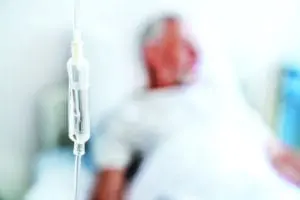Chemotherapy
Chemotherapy
Chemotherapy is usually used to treat advanced prostate cancer that has spread to other parts of the body.
Chemotherapy involves using drugs that can kill or slow the growth of cancer cells by poisoning them. There are many different chemotherapy drugs and some of these have been found to be effective in treating prostate cancer. The most common chemotherapy drug used in the treatment of prostate cancer is docetaxel (Taxotere). Chemotherapy is usually given as injections into a vein. More than one drug may be given. You usually receive these drugs as an outpatient and you may need to go for treatment every few weeks for several months. The exact timing and length of treatment will depend on the drugs that your doctor feels will be most effective. Chemotherapy slows down the growth of both cancer and normal cells and can cause side effects.
There are new types of chemotherapy, hormone therapy and other drugs that are being investigated for advanced prostate cancer that are likely to be available in the future. There are also many trials of new drugs and you should speak to your oncologist to see if you would be suitable for one of these trials.

What are the risks and side effects of chemotherapy?
The side effects will depend on the drugs that you receive and will usually stop a few weeks after the course of treatment is completed.
Side effects can include feeling sick, but you will be given drugs that are very effective at dealing with this problem.
Chemotherapy can sometimes cause damage to the cells in the bone marrow and this can temporarily cause fatigue and make you more prone to infections and bruising or bleeding.
Other side effects include:
- Hair loss
- Loss of taste
- Neuropathy which may manifest itself as a feeling of ‘pins and needles’.
Your doctor will explain the side effects for your particular chemotherapy regime.